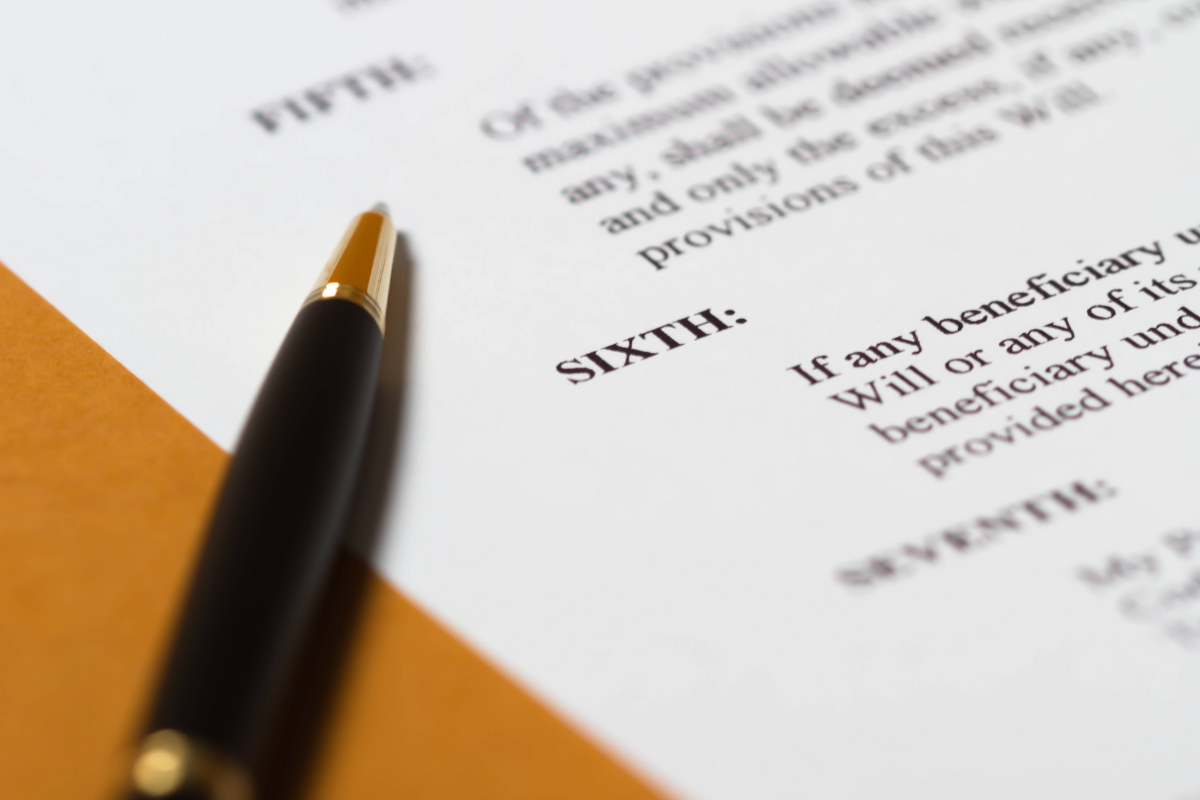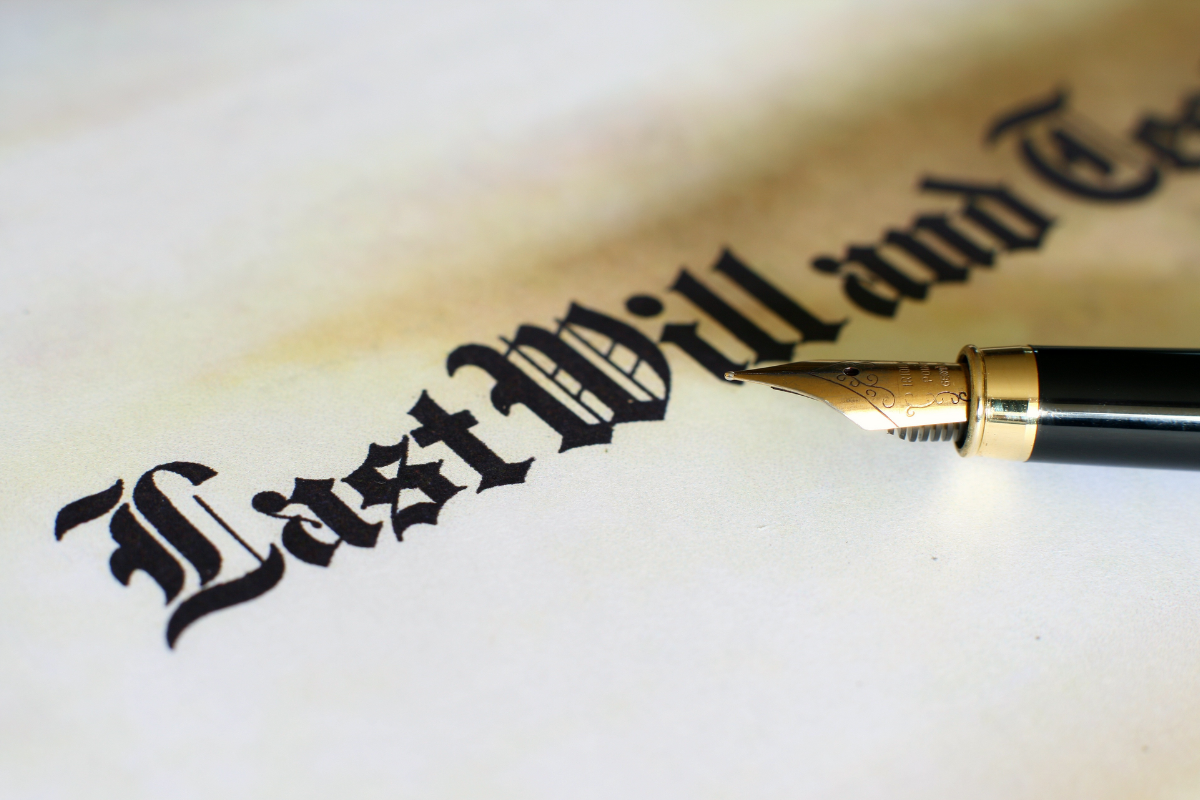Post Disclaimer: This blog reflects the author's personal experience with end-of-life matters and is provided in good faith for informational purposes only. While we aim to provide clear guidance on hard-to-find topics, this content is not legal advice and your use is at your own risk. Estate planning and end-of-life laws vary by location, so please consult your state's laws and seek guidance from a licensed attorney for your specific situation. We make no warranty about the accuracy or completeness of this information, which does not replace professional legal counsel. For more information, please see our full disclaimer.
Do you need a will? The answer is definitely yes, regardless of your age or assets.
Ensuring your intentions are documented spares your family unnecessary grief and stress.
It gives you control over who inherits your property; otherwise, you are left to the often complex and unpredictable state laws.
A will protects your family and ensures your wishes are followed after death. Without one, state laws determine how your assets are distributed, potentially causing family conflict and delays. Even with modest assets, a will provides crucial clarity and peace of mind.
Creating a will means your assets go exactly where you wish, avoiding conflicts and delays for your loved ones.
Fortunately, drafting a will doesn't have to be daunting or require a lawyer for every situation; more straightforward paths can secure your peace of mind without hassle.

Understanding the Importance of a Will
A will is not just a legal document—it's a guiding hand for your loved ones when you're not there to provide direction yourself.
It ensures that your wishes are clearly stated and followed, providing peace of mind and alleviating challenges for your heirs in a potentially difficult time.
Asset Protection
A will plays a crucial role in asset protection.
By clearly outlining who should receive your assets, you shield your loved ones from unnecessary legal complications.
This document significantly simplifies the probate process by delineating exactly how your estate should be distributed, thus accelerating the process, which otherwise might get ensnared in legal loops.
Without a will, your estate is left at the mercy of state laws that may not reflect your desires.
Guidance for Family
When a person passes away without a will, it can ignite disputes among heirs, often fueled by misunderstandings and emotional stress.
A well-crafted will acts as a blueprint, providing clear instructions and reducing potential conflict.
By specifying who should receive what and, perhaps more importantly, why, you provide assurance and direction for those you leave behind.
Understanding the significance of a will helps families maintain harmony and ensures everyone's expectations are managed.
Triggers for Creating a Will
Life has pivotal moments, and certain events make drafting a will imperative.
These include:
- Marriage or Divorce: Altering family dynamics makes revisiting or creating a will essential.
- The Birth of a Child: It’s crucial to establish guardianship and provide for your children's future.
- Acquiring Significant Assets: Owning a house or other substantial property necessitates updating or drafting a will.
- Starting a Business: Ensuring continuity and specifying succession plans are vital.
Each of these events brings about a shift in priorities and responsibilities.
Taking action guarantees that you're not relying solely on chance.
Learn more about when creating a will becomes necessary to prepare these vital documents and provide both you and your family with peace of mind.

Key Considerations When Creating a Will
Creating a will is more than just a legal necessity; it's an act of care for those you leave behind.
Ensuring you address specific critical points can make a real difference in fulfilling your last wishes.
Here's what to focus on:
Choosing the Right Executor
Selecting the executor of your will is paramount, as this person will handle the distribution of your assets.
A competent executor is not just trustworthy; they should have the organizational skills and financial acumen necessary to manage your estate effectively.
The executor will be responsible for everything from clearing debts to filing taxes, so choosing someone detail-oriented and resilient under stress is essential.
To better understand the responsibilities and qualities of an executor, check out How to choose an executor for your estate.
Guardianship Decisions
One of the most emotionally charged decisions in creating a will is determining guardianship for your children or pets.
Choosing guardians is about finding someone who shares your values and will honor your parenting style.
Consider their willingness, geographical location, and relationship with your children.
Communicating your intentions clearly and gaining consent from the potential guardians is crucial.
Explore how these decisions are made in Establishing Guardianship in a Will.
Difference Between a Will and a Trust
Understanding the fundamental differences between a will and a trust is key when planning your estate.
A will outlines how your assets will be distributed after your death, whereas a trust can manage your assets during your lifetime.
Trusts can help bypass probate, providing more privacy and potentially faster distribution to beneficiaries.
They also offer increased control over when and how your assets are disbursed.
Dive deeper into these distinctions with What is the Difference Between a Will and a Trust?
When a Will Might Not Be Necessary
While a will is essential for most, it might not be necessary in some situations.
For instance, a will might be redundant if all your assets, such as life insurance policies and retirement accounts, are jointly owned or passed via beneficiaries.
Similarly, if you're adept at managing all assets through trusts, the legal tool of a will may remain unused.
For more insight, refer to What Is A Will and Do I Really Need One?

Consequences of Dying Without a Will
Death is an inevitable reality, but few of us like to think about it in detail, especially when it involves legal procedures.
Yet, it’s crucial to consider these details to protect your family from additional pain.
Dying without a will can lead to a tangled web of legal, financial, and family conflicts that could take years to resolve and potentially cause irreversible damage to family relationships.
You give up your control without a will, and state laws take the wheel.
Here's what you need to know about what happens when you die without a will.
Intestate Probate Process
When someone passes without a will, they are said to have died "intestate," which triggers the intestate probate process.
This might sound straightforward, but intestate probate can be a cumbersome, drawn-out ordeal.
- Court Control: Without a will, the court appoints an administrator to manage your estate. This person might not be who you would have chosen, leading to outcomes you never intended.
- Public Hearings: Probate hearings are public, making your estate and family affairs known to everyone, potentially compromising privacy.
- Frozen Assets: The process can freeze assets temporarily, leaving your loved ones waiting and potentially struggling financially while legalities sort themselves out. Learn more about what happens.
State-Determined Heirship
Each state has its own rules, known as intestacy laws, which determine how your estate is divided if you die without a will.
These laws don’t consider personal preferences or family dynamics and can lead to results far from what you’d envisioned:
- Default Distribution: States often favor the closest family members, like spouses or children. However, if you have complex family structures, such as stepchildren, they might be excluded unless specifically outlined in a will.
- Unintended Beneficiaries: Intestacy laws might lead to estranged relatives or distant family members receiving part of your estate, contrary to your wishes. Understand how intestate succession affects your legacy.
Family Disputes and Delays
Without clear instructions, family members may have different interpretations of what you might have wanted, leading to disputes and tension:
- Emotional Stress: The lack of guidance often brings emotional and financial stress that can strain or break family bonds.
- Lengthy Process: Probate can take months or years, keeping beneficiaries from what they're rightfully due during a sensitive time. Navigate these potential family rifts with insights from legal ramifications.
Child and Pet Guardianship Complications
For parents and pet owners, not having a will leads to uncertainties around guardianship, placing children or pets at the mercy of the court's decisions.
The lack of a clear directive could result in guardianship being awarded to someone you might not have chosen, further complicating familial relationships and care structures.
The repercussions of not having a will extend far beyond legal battles; they touch the core of your family’s future well-being.
Ensuring you have a will is a compassionate and essential decision to spare your loved one's turmoil and protect your legacy as you intend.

Steps to Create a Will
Creating a will is a practical and thoughtful process that ensures your loved ones are cared for according to your wishes.
Here's a comprehensive guide covering the key steps of crafting a legally binding will.
Initial Preparation: List the Assets and Beneficiaries
Before drafting your will, taking inventory of your assets is crucial.
This includes properties, bank accounts, investments, personal belongings, and digital assets like online accounts or cryptocurrency.
Make a comprehensive list and decide who will benefit from these assets.
Prioritize your beneficiaries, considering family members, friends, and even charities you might wish to support.
Consider these steps when preparing:
- Assets: Break down all your tangible and intangible items.
- Beneficiaries: Clearly outline who gets what portion of your estate.
- Special Conditions: Decide if there are any specific conditions or distributions.
This foundation will ease the drafting process by clarifying your wishes in more detail.
Choosing Executors
The executor of your will plays a vital role in managing your estate after you pass.
Choose someone trustworthy, organized, and usually someone with some financial savvy.
They’ll be responsible for tasks like handling your debts, taxes, and distributing your assets.
Sometimes, people opt for professional executors like lawyers if their estate is complex.
Key points to consider:
- Trustworthiness: Select someone you trust implicitly.
- Capability: Evaluate if they have the time and skills to manage demanding tasks.
- Backup Executor: Always name an alternate if your first choice cannot serve.
Consider insights on selecting the right executor from TIAA's guide.
Using Online Tools
In today's digital age, online platforms make will creation accessible and affordable.
Many services guide you through the process with easy-to-follow templates and legal checks.
However, it's essential to ensure these platforms comply with state laws.
Some popular online tools include LegalZoom, Trust & Will, and Nolo's Quicken WillMaker.
Advantages of online will-makers:
- Cost-Effective: Typically cheaper than hiring a lawyer.
- Convenient: Complete it at your own pace from home.
- Guided Assistance: Many offer step-by-step instructions and checks for legality.
Explore options like 7 Top Online Resources for Making a Will to find a platform that suits your needs.
Finalizing the Will
Finalizing your will involves more than a signature. It requires legitimacy, often ensured by having witnesses and, in some cases, notarization.
This process affirms that your will is executed voluntarily and reflects your true wishes.
To finalize your will:
- Witnesses: Most states require two witnesses who are not beneficiaries.
- Notarization: Although not always necessary, it can further validate the document in some jurisdictions.
- Store Safely: Ensure your will is stored in a secure place known to your executor.
For detailed steps on finalizing your will, consider resources like this guide.
Taking these steps secures your estate’s future and provides peace of mind, knowing your wishes will be honored.
Whether you're using traditional methods or online tools, ensuring your will is legally binding is crucial for its enforceability.

FAQs About Wills
Navigating the intricacies of creating a will can sometimes feel overwhelming.
Here, we'll answer some of the most common questions to help clarify the process and address any concerns you might have.
What happens if I don’t have a will?
If you pass away without a will, your estate is subject to the laws of intestacy, meaning state law will decide how your assets are distributed.
This could result in unintended individuals inheriting your property or assets.
Understanding these consequences is essential since the absence of a will leaves significant decisions in the hands of the state, potentially leading to lengthy legal processes and family disputes.
Learn more about the implications of not having a will.
Can I update my will later?
Absolutely. Life evolves, and your will should reflect changes in your wishes or circumstances.
Updating your will can be done through a legal process known as a codicil or by drafting a new will entirely.
Both methods require your signature and the signatures of witnesses to validate the changes.
Regular updates ensure your will accurately reflects your current intentions and life situation, protecting your loved ones and assets.
Read about how frequently you should update your will.
How much does it cost to create a will using an attorney?
Creating a will with an attorney can range widely in cost.
Expect to pay anywhere from $300 to $1,500 or more for a simple will.
While it's often pricier than online options, utilizing an attorney can provide peace of mind through personalized legal expertise.
For those with complex estates, attorney-drafted wills might be a wise investment.
Explore what goes into the cost of an attorney-prepared will.
Are online wills legally binding?
Online wills are legally binding, provided they comply with state-specific requirements.
These platforms work with legal experts to ensure your will meets the necessary criteria, but verifying these details is crucial.
Consider the simplicity of an online will for straightforward estates; however, consulting a lawyer could be beneficial for more complex scenarios.
Find out more about when online wills are appropriate.
Who should I choose as an executor?
Choosing an executor is critical, as this individual will oversee your estate's final distribution.
Look for qualities like trustworthiness, organizational skills, and reliability.
It’s often recommended that you select someone unbiased who can handle responsibilities under pressure and maintain emotional balance throughout the process.
If your first choice is unavailable, consider naming a secondary executor.
Discover additional tips for selecting the right executor.
Understanding these key aspects surrounding wills can significantly alleviate concerns and simplify estate planning, ensuring smoother transitions for you and your loved ones.

Wrap-up: Do I Need a Will?
Deciding to create a will is vital in safeguarding your estate's future.
It ensures your assets are distributed according to your wishes, reducing uncertainty and stress for those you leave behind.
Establishing a will gives you peace of mind, knowing you've taken proactive steps to protect your loved ones.
Writing a will is more accessible than you might think.
Whether using online tools or consulting with a professional, it's a manageable task that offers significant security.
Don't wait for life changes or unforeseeable events—take charge now and ensure your legacy is preserved as you intend.
Reflect on the actions you can take today. Consider starting your will creation process or updating an existing one.
Ensure your intentions are clear and binding, providing a lasting impact on the people you care about.
If you haven't started this essential process, make today the day you begin.
Your loved ones depend on it.
Check out the Up & Doing glossary page for an alphabetical listing of key terms related to estate administration, funeral planning, and other end-of-life topics.




